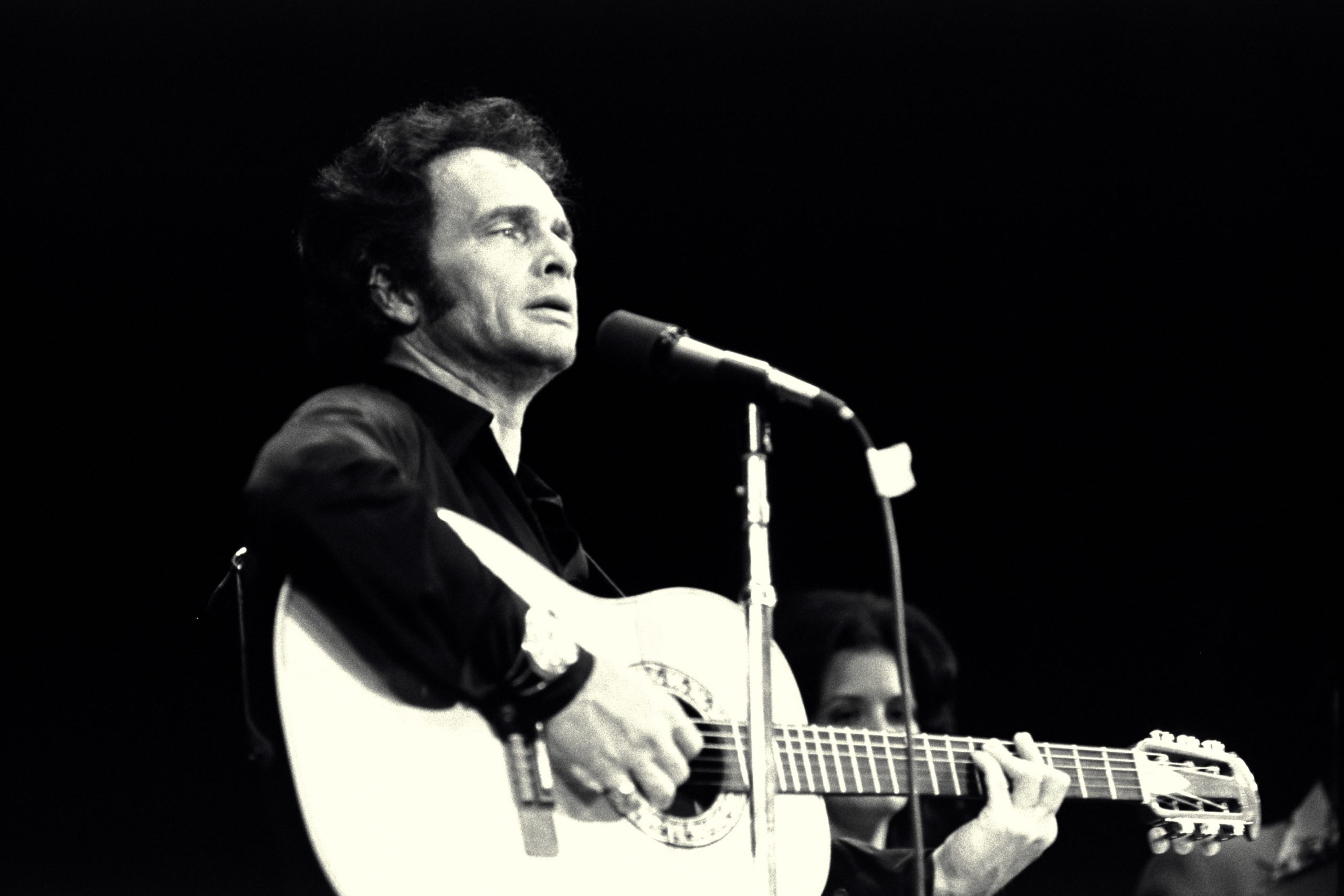It has been a cruel season of loss in the music community, felt most recently with the departure of Merle Haggard, the titan of American song who passed away last Wednesday on the occasion of his 79th birthday. Along with Buck Owens, the Oildale, California native helped establish the venerable strain of country music known as the Bakersfield Sound, authored countless classic hits, and ultimately staked a claim as the poet-laureate of a proud, working-class America. A nonpareil builder of worlds through song, Haggard brought us uncanny portraits of many of society's least glamorous and most laudable contributors. His was a landscape populated by truck drivers, steel workers, union men, and reformed criminals-made-good. Taken together, it is a snapshot of American life still vibrant but increasingly moved to the margins of the political and cultural consciousness throughout Haggard's life and career.
Born under hardscrabble circumstances to Depression-devastated parents, young Merle was a reckless youth with a criminal streak. Petty crimes led him to multiple incarcerations in his teens and eventually a serious piece in the high security San Quentin Prison. Smart enough to know that prison life didn't suit him, and talented enough to do something about it, Haggard was able to parlay his performing and songwriting chops into a lucrative career within a few years of his release.
Spectacularly talented as a writer, performer, and interpreter of others' material, it took the prolific Haggard little time to attain superstar status and the admiration and acceptance of peers and forerunners like Johnny Cash, George Jones, Buck Owens, and especially Willie Nelson, whose Western swing dovetailed beautifully with Haggard's Bakersfield twang on several albums of winning collaborations. The last of these, 2015's wonderful Django & Jimmie, touchingly reflects on their influences, friends lost along the way, and their own pending mortality in a manner made more poignant by recent developments.
For all of his appropriate stature as an American icon, the closest comparison to Haggard's combustible combination of tough guy swagger, sepia-tinged nostalgia, crushing vulnerability, and unabashed working-class pride is perhaps Ray Davies of the Kinks. In song and life, the two geniuses are rebels equally distrustful of establishment mores and counterculture pieties. Vested with deep-seated patriotic identifications and deeply felt working class roots, they view the complications of modern life as tragically unnecessary -- technology as subtraction by addition. Both hearken to and lament bygone eras, where genteel traditions and common sense overrode the chaos and insanity of modern times. The distinct strain of small-"c" conservatism that can be heard in Haggard's defiant, born-poor anthem "I Take A Lot Of Pride In What I Am" is reflected in Davies' like-minded refrain "I'm Proud To Be a Muswell Hillbilly Boy." The future-shock pessimism of Davies' "Where Have All The Good Times Gone?" would later be echoed in Haggard's marvelously despairing "Are The Good Times Really Over For Good?"
During the Vietnam Era, Haggard's songs "Okie From Muskogee" and "The Fighting Side Of Me" were huge hits that lampooned bourgeois campus types whose protests he judged to be glib and wrongheaded in their message and execution. The impact of these songs was predictably polarizing, but he had a point. Vietnam was an unparalleled tragedy and a foreign policy catastrophe of the highest magnitude, but the condescension demonstrated by the college deferment crowd toward the conscripted GIs during and after the war was a disgrace beyond any measure. Ultimately Haggard's intention was not to posit the relative virtues of a Hawkish or Dovish foreign policy, but rather to reinforce a baseline commitment to the notion of American virtue that he felt was under assault from a cosmopolitan class of moneyed insurgents. "Okie From Muskogee" is not a great or even good song, but weighed against the nightly, largely ignorant anti-war "raps" dispensed to their audiences by the odiously self-satisfied Crosby, Stills & Nash, it was perhaps a proportional fit of pique.
Haggard also dealt with love -- its rapturous highs and brutal consequences -- with a level of forensic detail that defied comfort and denied resolution. Perhaps the only antecedents in American song to the journalistic, too-close-for-comfort romantic autopsies like "What Am I Going To Do With The Rest Of My Life?" and "I Started Loving You Again Today" might be found in the most confessional work of Cole Porter and Lorenz Hart. It is difficult to extrapolate how much of his five marriages and countless wrong turns in his personal life informed love songs so visceral, but the real-talk influence of this close-to-the-bone honesty is nearly impossible to calculate.
Owing to his innate intermingling of the personal and political, to his careful balance of rage and rapture, Haggard's followers range from great country performers Randy Travis and Dwight Yoakam, to rock royalty like Elvis Costello and Bruce Springsteen, to the outlaw gutter punk of the Mekons and Wussy. As a songwriter his legacy is indelible. As an avatar of a hard working, decently compensated middle class, Merle Haggard's passing may represent the permanent eclipse of a specific type of American life. Here are 10 of the man's best.
10. "What Am I Gonna Do (With The Rest Of My Life)?" (from That's The Way Love Goes, 1983)
In a catalog filled with some of the most crushing breakup ballads ever authored, few are more impactful than this wry, devastating rumination on the internal bargaining that occurs when you are living through real-time heartbreak, hour by excruciating hour. Here the narrator engages in the simple task of listing various distractions from his lost love -- smoking, drinking, hanging out with friends -- only to realize that the sum total of these divertissements will only get him through one more night, with only more dark days to follow. The quietly knowing chorus brings with it the hellish implication that rock-bottom misery is the singer's new normal.
[videoembed size="full_width" alignment="center"][/videoembed]
9. "Mama Tried" (from Mama Tried, 1968)
1968's "Mama Tried" is a Platonic ideal of a Merle Haggard song: a taut, irresistibly catchy 2:15 seconds, which manages a classic riff, a full family history, and a novel's worth of drama and regret. The proceedings are abetted by tremendous performances from Haggard's band the Strangers, and included the phenomenal work of guitar ace James Burton. Haggard's economy of language and eye for detail are an absolute marvel here, signaling his uncanny ability to bring vivid characters to life within the span of a few short verses.
[videoembed size="full_width" alignment="center"][/videoembed]
8. "Silver Wings" (from A Portrait Of Merle Haggard, 1969)
A touchingly straightforward ballad of romantic love and loss, as exemplified by the sight of an airplane fading from view, slowly delivering a loved one to a faraway destination. Over a gently rolling melody, Haggard juxtaposes the beauty of the plane's glimmering arc with the singer's nosedive crash into misery. Simple, elegant, and stunning.
[videoembed size="full_width" alignment="center"][/videoembed]
7. "Swinging Doors" (from Swinging Doors, 1966)
One of the greatest honky-tonk rave-ups ever written, "Swinging Doors" is a missive from an estranged lover to his former partner, informing them that he can be found night and day in his new digs -- the bar down the street. A landmark early Haggard recording, this is the full flowering of his Bakersfield sound, buttressed by Ralph Mooney's unmistakable pedal steel and Bonnie Owens' indelible harmonies. It is an utterly idiosyncratic sound that would be endlessly imitated in the decades to follow.
[videoembed size="full_width" alignment="center"][/videoembed]
6. "If We Make It Through December" (from If We Make It Through December, 1974)
A wonderfully rendered story of a hard-working man trying to keep his family's spirits up after being laid off, this is Haggard at his social realist best, compellingly reminding the world of those who have been left behind and left in the shadows through no fault of their own. Lamenting that December should be a happy time of year, and gutted that he cannot afford Christmas presents, the narrator reasons that better times lay ahead if they can just make it through to a new year. The song serves as a quiet prayer, and all the more poignant given that there seems to be no clear sense this prayer will be answered.
[videoembed size="full_width" alignment="center"][/videoembed]
5. "Kern River" (from Kern River, 1985)
This majestic, hauntingly sad ballad from 1985 reflects some of Haggard's greatest nature writing, as he describes the panoramic sweep of Lake Shasta, Mount Whitney, and the dread Kern River itself, "a mean piece of water, my friend." The song is a recollection of a lost lover drowned in the river, but as details begin to pile up, it becomes something more like a Biblical parable: a desperate portrait of a man attempting to hold onto his humanity, and a tribute to the beauty and terror of nature's uncaring and unceasing capriciousness and cruelty.
[videoembed size="full_width" alignment="center"][/videoembed]
4. "Today I Started Loving You Again" (from Okie From Muskogee, 1969)
Co-written with his former wife and band mate Bonnie Owens, this 1969 single posits romantic love as a sort of Sisyphean challenge, impervious to reason and immutable through time. The tone is one of curious resignation, as though love itself were a kind of malignancy: "I got over you long enough to let my heartache mend/ then today I started loving you again." This is Haggard at his most insidiously perverse -- what might appear at first blush a tenderly devotional song, reveals itself as something more like a cry for help. There is no 12-step program for recovering from romance, but if there were the singer may well belong there.
[videoembed size="full_width" alignment="center"][/videoembed]
3. "Sing Me Back Home" (from Sing Me Back Home, 1968)
This moving ballad portraying a condemned prisoner's final moments and last wishes is a typically humane Haggard take on a member of a marginalized and even despised sub-group. In keeping with his frequent themes of transgression and redemption, Haggard does not suggest that the condemned man is innocent, or even that he should be pardoned. He merely finds the humanity in the last minutes of a misspent life that allows his subject to regain some semblance of connection to a better time and place. It's called mercy, and Haggard's songs have it in spades.
[videoembed size="full_width" alignment="center"][/videoembed]
2. "Footlights" (from Serving 190 Proof, 1979)
The bone-deep, slow-burning confessional of 1979's "Footlights" is a weary lament of professional and emotional exhaustion, and a devastating demystification of stardom. Haggard sounds stoned, even narcotic, singing an opening verse whose harsh personal inventory might send a cold chill up the spine of Leonard Cohen: "I live the kinda life most men only dream of/ I make my living writing songs and singing them/ But I'm forty-one years old and I ain't got no place to go when it's over/ So I hide my age and make the stage and try to kick the footlights out again." This is rough existential terrain, where all of the fruits of your talent and labor have left you bereft of purpose and joy. On "Footlights" Haggard leaves it all on the field, tearing away one mask after another to reveal the terrible hollowness that lay beneath his swagger.
[videoembed size="full_width" alignment="center"][/videoembed]
1. "The Bottle Let Me Down" (from Swinging Doors, 1966)
Equal parts winsome and tragic, this great early Haggard classic makes display of his literary gifts, as the emotionally broken narrator blames his romantic frustrations on the inanimate -- namely the liquor he relies upon to drown the memory of his lost love. Haggard has a deft comic touch, and verses like "I've always had a bottle I can turn to/ And lately I've been turning every day/ But the wine don't take effect the way it used to/ Now I'm hurting in a old familiar way" roll out as one classic punchline after the next. The rollicking mood however only barely papers over the underlying sadness of an abandoned paramour so deluded that he thinks of the bottle as his "one true friend." Or at least he did.
[videoembed size="full_width" alignment="center"][/videoembed]
Listen to the playlist on Spotify.






